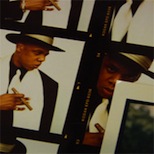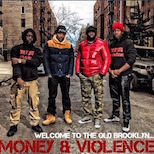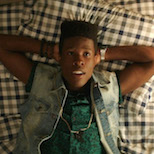“Hidden Colors” Director Talks New Doc and Race in America 2014
07.03.2014
LEISURE
In 2011, author, radio personality and relationship expert Tariq Nasheed released a documentary on the history of African and aboriginal people titled Hidden Colors. The film and its weighty subject matter was a success and led to a second installment titled Hidden Colors 2: The Triumph of Melanin a year later. The critical acclaim had led to Nasheed taking the series to new heights with Hidden Colors 3: The Rules of Racism. The film tackles everything from the history of African American inventions down to the controversial subject of African American organ trafficking in America and features the likes of Nas, David Banner, Paul Mooney, Dick Gregory and more. The topics are heavy but the film is certainly a must-see for anyone who has an interest in history. With a theatrical release on the horizon Life+Times caught up with the voice behind Mack Lessons Radio to discuss how a relationship expert segue ways into African history, why more movies like his aren’t in the mainstream and the reality of the television raising our children.
Life+Times: With a film with such heavy historical content, who is your intended audience?
Tariq Nasheed: My intended audience isn’t the conscious crowd because they pretty much know these things. My audience is the regular people who would not know of a John Henry Clark and a lot of the younger hip hop cats. They need the information more. The average hip hop kid or college kid that is not used to getting this information so I wanted to make it as digestible as I could.
L+T: You made a name for yourself courtesy of your radio show and books on relationships. How did you transition into a film about African history?
TN: Learning about African history has been a hobby since I was a kid. Although my expertise is relationships and giving advice, there’s a direct correlation between racial politics and relationships. When my books came out, different nationalities would ask me questions because they had different issues in regards to race. Interracial dating is still a taboo subject as well as the dynamic between black men and women. Getting into a relationship with a systematic white supremacist mindset isn’t discussed. Elliot Rodger, who had that mass killing in Isla Vista this year, had issues with dating. The video and documents he left let you know that he’s a white supremacist that felt entitled to get certain women. There’s a direct correlation between racism, white supremacy and relationships but people don’t like to talk about it. Race is something we have tried to avoid but all roads lead back to racism and I wanted to tackle it head on.
L+T: Why do you think we don’t see many films that tackle these issues made today?
TN: A lot of people in the black community depend out outside funding. But when the outside funds projects, especially when it comes to black people, they are going to fund things that are going give praise and maintain systematic white supremacy. This is why we’re going to keep getting The Butler, The Help, 12 Years A Slave, and so on because we keep depending on the dominant society to fund it. They aren’t going to empower you with material. This is why it is important that we pool together our resources to tell our own story.
L+T: One of the more controversial subjects in the film is that of organ trafficking and the elaborate schemes used to kill African Americans for their vital organs. Where did this come form?
TN: I kind of stumbled upon that information. I traveled to other countries and I’d hear stories. IN hidden colors 2 we touched on it a little bit but I started to do more research and realized how prevalent it was. This is definitely a topic that is taboo and it’s almost unbelievable that people would do these kinds of things it sounds like a science fiction movie but when you look at recent articles, there’s a kid in Atlanta that was found did with his organs taken out. There are multiple cases where black people are turning up did, their organs are missing and nobody is saying anything. You can find stories like this in the media outside of the US but its very suppressed here. You can’t get what you need from the mainstream media here.
L+T: Rather than have a bunch of scholars the average person doesn’t know, you feature both David Banner and Nas in the film. And they aren’t simply there for cosmetic reasons as both have a lot to offer.
TN: I love David Banner; he’s a very thorough and underrated brother who has always spoken on racial politics. I reached out to him and he was down. Nas reached out to me because he was a big fan of the first film. I wanted to show everyone that there are people within the hip hop community that are very articulate when it comes to racial politics. I notice that a lot of time when the subject of racial politics comes up in the media, they will go throw a microphone in a rappers face who is not even known to talk about racial politics and they’ll give an answer that makes the whole community look at them sideways.
L+T: Why do you think it is that we don’t see as many hip hop artists coming out to challenge the system like we did in the 80s?
TN: Because the last 45 years had men being raised in single mother households and there is a lot of feminine energy. A lot of people are taught don’t resist or rebel because your mother may get hurt. The woman energy is very nurturing and they want to protect and the way they want to nurture you is by submission. They teach a lot of males out here to be submissive when it comes to dealing with white supremacy. So this is why you have a whole bunch of kids who won’t even challenge the issues because of this submissive attitude. We have to get outta that mindset, especially the men.
L+T: There’s always an argument that what’s on television should be considered entertainment, but it’s a little deeper than that. What are your thoughts on the television and various forms of media being a means of education?
TN: Media educates you every time you turn on the television. If you are looking at a cartoon that is seemingly innocent, it is actually teaching you something. When you see the bad character with black hair and the good character with white hair, that’s teaching you. In the movie Rio, the good people are the lighter people and the evil people have braids and afros. You’re being educated when you watch TV all the time, this is why they have the history and discovery channels that show these European warriors and leaders while black people are virtually non-existent.
L+T: The fact that you are able to make a third installment to Hidden Colors does prove that people want to learn from these media sources though…
TN: It just shows that people are thirsty for real information. There’s a misconception that black people don’t want to see movies like this and Hollywood won’t make these kinds of movies because of that. That’s not the case. Black people will go see a good story but you have to present it a certain way. This movie series is the most successful documentary on African history ever. I’m very proud of that.
L+T: Did the success surprise you?
TN: I was surprised. The reason I did the first one was because of all these slave movies being put out. We complain but why aren’t we doing anything to fix it. I decided to put a film together and see how it goes. I remember being at the screening in 2011 and I didn’t know what the vibe was going to be like but when it ended people were crying and applauding.
L+T: One of the most important things about this film is that you offer solutions. How important is it for us to not just be complainers but problem solvers?
TN: When it comes to talking about racial issues, in a lot of conservative circles they do the boogeyman theory. They will put out a lot of books speaking negatively about black people. I didn’t want to make a boogeyman type of thing and complain just to complain. I wanted people to know the history and now that we have that we can build toward a solution and correct the ills of the community.





